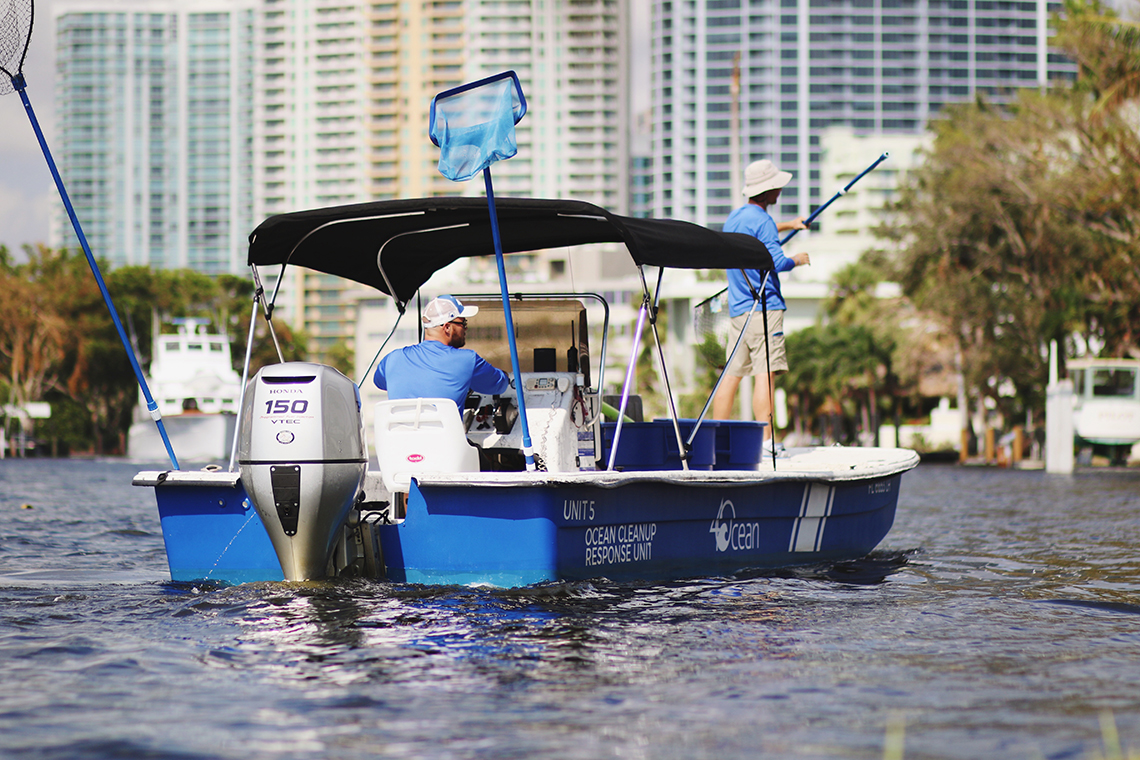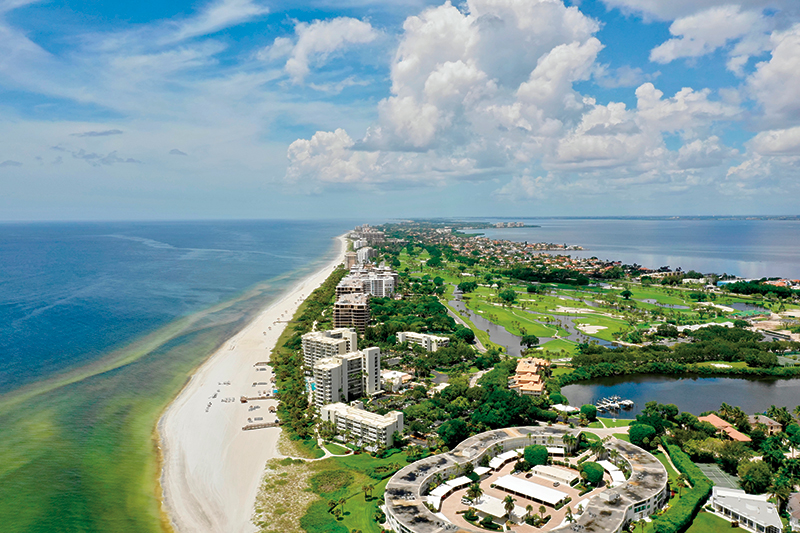
You can see plenty of fancy boats parked at the Pier Sixty-Six Marina. Then there’s the smaller blue one with “4Ocean” painted on the side. It might not look as impressive at first – but wait until you hear what it does.
The famous Fort Lauderdale resort’s marina has partnered with 4Ocean, a Boca Raton-based organization that raises money and cleans trash from oceans and waterways thanks to specially outfitted boats like the one at Pier Sixty-Six. The organization now has a footprint around the world, but it’s based here in South Florida – including a spot at Pier Sixty-Six, thanks to the relationship between marina and organization.
“For me personally, the yachting world, we have a huge impact on the ocean and all the waterways,” says Megan Lagasse, Pier Sixty-Six’s marine director. “It’s always been a really important thing to me and I was fortunate enough to meet the [4Ocean] gentlemen through a mutual friend.”
That was two years ago, and Lagasse immediately knew she wanted to work with the organization. “I was amazed at everything they were putting together,” she says. “It’s a very important part of the new [Pier Sixty-Six] ownership – not only learning, but also giving back to the environment.”
It’s an observation worthy of Captain Obvious to note that the boating and yachting industry has a unique relationship to the water. From marinas to boatbuilders to captains and crew, it’s an industry full of people who spend time on and around the bodies of water that make Florida such an appealing destination. But what obligation do they have to it? As red tides stain the state’s west coast and algae blooms infect the waters that flow from Lake Okeechobee – as well as some Fort Lauderdale canals, though local officials are quick to note those are smaller, seasonal and not related to Lake O problems – it’s a question worth pondering: What responsibility does Fort Lauderdale’s great, watery industry have towards the water?
Phil Purcell has a few thoughts on that.
The president and CEO of the Marine Industries Association of South Florida sees his organization and the high-dollar industry it represents as possessed of the clout to bring lots of problem-solvers together. First though, he’d like more Floridians to think collectively about how these problems need to be solved.
“We’re a state that’s blessd with natural resources,” Purcell says. “What a state that’s loaded with stuff. Yet we don’t own any of it. We think of it as merely the beaches; we don’t understand the rest of it.”
He compares it to the Pacific Northwest, another region he knows very well – before coming to Fort Lauderdale and MIASF, he built his career in yachting at Washington state’s Westport Shipyard. Go to a place like Seattle, he says, and you’ll find people who see nature as part of their civic identity. Realtors talk about water or mountain views. Hiking boots are de rigueur. The stereotypical Seattleites are the couple with a kayak or two on the roof of a VW van.
That lifestyle, Purcell says, leads to a natural inclination towards stewardship. And here? Well of course, Purcell says, people go to the beach. But beyond that, so much of Florida’s natural world is out of sight, out of mind. Or when we do mention it, it’s scary and problematic.
“Here we focus on the negative,” Purcell says. “If it’s the Everglades, we talk about the anaconda that got loose.”
Are there problems at the policy level? Absolutely, Purcell says.
“Do we move too slow as a state? Yeah, everything in a state moves too slow,” Purcell says. “Do we blame our elected officials? Yeah, but we can blame ourselves too.”
People have got to become interested, and solutions have to become available. That leads Purcell onto a topic he enjoys. South Florida as the “Silicon Valley of the Seas” is a concept MIASF has championed over the years. It’s basically the idea that the region’s four big research universities – Florida Atlantic University, Florida International University, Nova Southeastern University and the University of Miami – could be seen as a world-leading foursome. The sort of group that deep-pocketed individuals – say, the kind who already keep their yachts in South Florida part of the year – might want to write checks for.
The goal, Purcell says, “was to take the four universities, realize they are constantly doing research, and help them monetize that research to help.”
Again though, perception matters there. It’s perceptions, Purcell believes, that his industry can help shape. But perception of a place starts with the people who live in that place.
“Let’s really think about what we own and what we are and what we want to be,” he says. “These universities are working on global solutions.”
Back at Pier Sixty-Six, they’re working to get the word out at ground level – literally. 4Ocean-branded recycling bins are all over the marina. It’s one little way of reminding people about what’s happening here.
“We’re passing that message onto our customers,” Lagasse says.
“Sometimes people just don’t know about these amazing groups. Just spreading the word is great.”














1 comment
For 30 years I lived on one of the deepest canals off Las Olas. Where I was privileged to be surrounded by boats owned by those with their names on local buildings. And watched their workers toss open paint cans, all manner of maintenance materials, blackwater holding tanks into the canals without a thought. Oil spills at least once a year. Call the city, never the slightest bit of response.
No doubt Phil Purcell wants a collective response. The “people” naturally. Anything to insure the boat industry isn’t the focus point of any responsibility let alone solution.
For sure